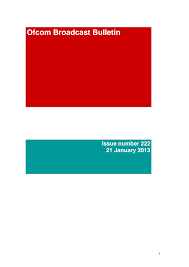Understanding the Role of Ofcom in UK Communications

Introduction to Ofcom
Ofcom, the Office of Communications, plays a pivotal role in regulating the UK’s telecommunications, broadcasting, and postal services. Established in 2003, Ofcom aims to ensure that consumers can access a wide range of quality services and that there is fair competition within these markets. Acknowledging the fast-paced advancements in technology, Ofcom’s regulatory framework is crucial, especially in the era of digital transformation.
Current Developments and Responsibilities
As of late 2023, Ofcom is increasingly focused on issues such as net neutrality, digital inclusion, and online safety. One significant development is the regulator’s commitment to enhancing broadband access across the UK, particularly in rural and underserved urban areas. According to Ofcom’s latest reports, approximately 85% of UK homes can now access full-fibre broadband, a significant increase from previous years, but challenges remain in reaching the final 15%.
Ofcom is also tasked with overseeing content standards in broadcasting. Recently, they have intensified scrutiny around content moderation, particularly concerning misinformation and harmful online material. In response to growing concerns about online safety, Ofcom has collaborated with various stakeholders to push for more stringent regulations regarding social media platforms.
Public Interests and Consumer Protection
One of Ofcom’s most critical roles is its commitment to consumer protection. The regulator has introduced several initiatives to empower consumers, including simpler processes for switching service providers and clearer pricing information from telecommunications companies. Recent data indicates that complaints about mobile and broadband services have decreased, suggesting that Ofcom’s regulatory efforts are yielding positive outcomes for consumers.
Future Outlook for Ofcom
Looking forward, Ofcom is anticipated to expand its oversight into emerging sectors such as 5G and the Internet of Things (IoT). The convergence of telecommunications and broadcasting mediums will require continuous adaptation and enforcement of regulations to ensure fair competition. As technology evolves, so will Ofcom’s policies, tasked with protecting consumers and fostering innovation in the sector.
Conclusion
In conclusion, Ofcom remains an integral part of the UK’s communications landscape, ensuring that the interests of consumers are protected while promoting competition and innovation. As digital communications continue to expand and evolve, Ofcom’s regulatory framework will be vital for ensuring that the UK remains at the forefront of technological advancements while safeguarding public interests. For consumers and businesses alike, Ofcom’s actions hold significant relevance and will shape the future of connectivity in the UK.








